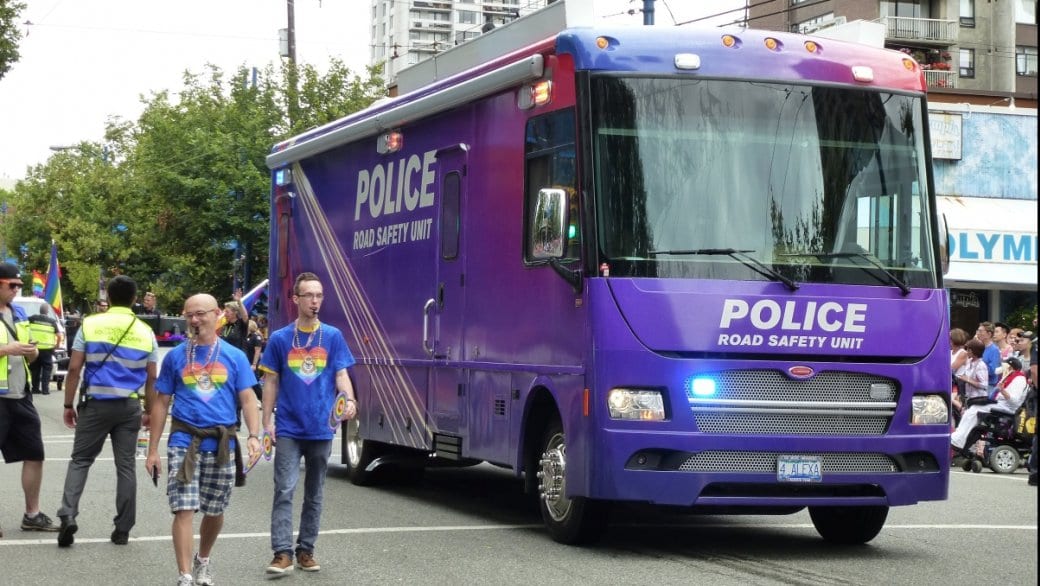While Pride Toronto’s members voted to accept Black Lives Matter’s demands and keep uniformed police out of this year’s parade, Vancouver Pride organizers prefer a different approach.
Andrea Arnot, Vancouver Pride’s director of events, says this city’s queer, trans and people of colour communities have a different history with police than communities in Toronto and other big North American cities.
“I think it historically hasn’t been quite as violent as it has in Toronto and other places in North America,” Arnot says. “There are scars and wounds from times past and there needs to be acknowledgement on that, but I am a believer in hearing people and helping them work through any trauma from that past history and find a way to move forward and help them make changes that are positive.”
Arnot says the Vancouver Pride Society (VPS) sought a dialogue with the local chapter of Black Lives Matter after BLM Toronto held a sit-in at last year’s parade. Following the protest in Toronto, Vancouver police voluntarily reduced their vehicles in the parade and left their armoured car at home, Arnot notes.
Cicely-Belle Blain, co-founder of Black Lives Matter Vancouver, agrees that the Vancouver Police Department (VPD) is not the same as its Toronto counterpart, but says anything less than a full rejection of police at Pride does not go far enough.
“We stand to the same call with Black Lives Matter regardless of the situation they’re in,” Blain says. “A lot of the experiences here of black people would obviously be different than somewhere like New York or Toronto, but the main purpose of Black Lives Matter is to stand against police brutality, so we cannot accept police involvement in the Pride parade, regardless of which city they are in, and given that Pride originates from political protest.”
Arnot acknowledges that recent online polling and community consultation by Vancouver Pride has shown that police involvement is still a sore spot for some community members here.
“I think we have to have more discussions,” Arnot says. “Nothing is set in stone, but we want to talk to the VPD about having fewer uniformed officers with weapons present.”
“We don’t know yet what a compromise might look like,” she says, “but that might be one.”
Blain says Pride is meant to be a celebration of marginalized communities, and “police don’t belong in that circle.”
Black Lives Matter Vancouver would like to see Pride organizers take more responsibility, Blain says.
“They are seeing it as having to maintain a good relationship with the police department. But historically the police have used violence and intimidation towards queer and trans people and I don’t think we can make exceptions. We would like to see further actions from the VPS in the next few months.”
Blain says Black Lives Matter will not consider participating in or endorsing the Vancouver Pride parade unless uniformed police and vehicles are fully removed.
Arnot says the VPS aims to boost representation of different marginal groups at Pride events in 2017, and will reserve space in the parade and provide funding for some marginalized groups to participate, rather than the previous first-come, first-served model.
Vancouver Pride would also like to support events by and for community groups that may be underrepresented.
“I think VPS is often viewed as a big corporate organization,” Arnot says. “We’re not; we are just 10 little staff even in our busy season, with a volunteer board, and we can’t do everything for everyone. People who have a certain interest or a certain life experience sometimes need an event that we just don’t have the capacity to do. So if they are already doing something, they are the experts on how to create an event to have safe space to express themselves, and we want to provide the resources to do that.”

 Why you can trust Xtra
Why you can trust Xtra


